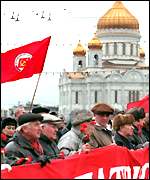
back

|
 |
Elderly yearn for Soviet-style stability from poll
From Gazeta.ru via Getaway Russia
19 November 2003

Svetlana Babichenko sells fur hats to top up her pension – a far cry from the stable retirement she was promised under communism. That, for her and millions of elderly Russians like her, is the sole issue in the December 7 parliamentary election.
"When you've got bread but no butter, you do all you can to get the butter," she said, shivering at her market stall.
Babichenko, 77, is one of Russia's 29 million pensioners who were among the biggest losers when the Soviet Union's collapse in 1991 propelled Russia into capitalism and a free market. They gained political freedom, but lost cheap food, rent and state benefit. They can only shake their heads at newspaper reports of Kremlin wrangling with "oligarch" businessmen who made billions of dollars in the 1990s selloff of state property. Babichenko, once a factory-hand, has resorted to selling the hats along with husband for sheer survival.
"I get just over 1,000 roubles ($33) a month. How can you live on this?" she said. She needed at least two and half times that just to make ends meet. "The most important thing is that they raise pensions," she said of the government ahead of the elections. "They keep saying they are raising them, but I don't notice any difference."
Poverty and the welfare of the elderly are critical issues seized upon by all parties.
President Vladimir Putin, who will watch the showing of the pro-Kremlin United Russia party as a pointer to his prospects for re-election next year, has declared a war on poverty as part of dragging Russia into the modern era.
The opposition communists, in second place behind United Russia in the polls, portray themselves as champions of what experts say are 40 million Russians living in poverty. In the months leading up to the poll, authorities announced several increases for pensions. But many have never recovered from the hyper-inflation that wiped out savings in the immediate aftermath of the fall of communism.
"It is the ultimate humiliation," said a 60-year-old woman begging in a metro station a short walk from the Kremlin. "I never saw anyone begging in the Soviet Union." She longed for a return to Soviet times when pensioners, one in five Russians, were guaranteed enough to live on and workers could rely on government-provided jobs and housing. "I never could see the problems people talked about – I always knew how much bread cost," she said. "Now you never know how much it's going to cost."
A communist-era job paid her enough to rent a comfortable flat and own a car. Now at the end of a day of asking for handouts, she retires to a bench in a railway station.
The entrepreneurial spirit which has become the ethos of the post-communist era has widened divisions and left the elderly, used to relative social equality, to fend for themselves.
"If I sell these, I get to eat," said Zina, 76, pointing at the assortment of hand-knitted mittens draped over her arm. "There are so many millionaires and billionaires. Not to mention the oil. And yet we do not see any of the money."
The Russian Party of Pensioners is one of 23 groups competing in the election but almost certain to win no seats in the Duma lower house. It calls for some of the profits made from resource industries to be used to boost pensions. "We propose that money from selling natural resources go to each citizen," said spokesman Oleg Yefrosinin. "This money at the moment is going to oligarchs."
Copyright
© 2002 Global Action on Aging
Terms of Use | Privacy
Policy | Contact Us
|

